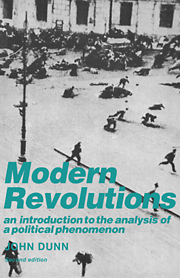Book contents
- Frontmatter
- Contents
- Preface to the first edition
- Introduction to the second edition
- Introduction: the ideological dilemmas of moden revolution and its analysts
- 1 Russia
- 2 Mexico
- 3 China
- 4 Yugoslavia
- 5 Vietnam
- 6 Algeria
- 7 Turkey
- 8 Cuba
- Conclusion: approaches to the ideological assessment and causal explanation of modern revolutions
- Notes
- Bibliography: guide to further reading
- Supplementary reading, 1971–88
- Index
- Frontmatter
- Contents
- Preface to the first edition
- Introduction to the second edition
- Introduction: the ideological dilemmas of moden revolution and its analysts
- 1 Russia
- 2 Mexico
- 3 China
- 4 Yugoslavia
- 5 Vietnam
- 6 Algeria
- 7 Turkey
- 8 Cuba
- Conclusion: approaches to the ideological assessment and causal explanation of modern revolutions
- Notes
- Bibliography: guide to further reading
- Supplementary reading, 1971–88
- Index
Summary
At the beginning of the twentieth century the territory which is now Turkey made up the heartland of the Ottoman empire, an Islamic empire which had controlled to some degree, between the sixteenth and nineteenth centuries, a great part of the Mediterranean littoral from Tangier along the North African coast to the east and back along its northern shore as far as the Adriatic. In the sixteenth century up to the battle of Lepanto the Ottomans had threatened the conquest of the whole Mediterranean world in a way in which no Moslem power had done for more than half a millennium. As late as the 1680s Ottoman armies threatened the Hapsburg capital, the city of Vienna. By 1900, though, this expansive vigour was far in the past. Some parts of the empire, particularly Balkan countries like Greece and Serbia, had liberated themselves. One, Egypt, had in effect established its administrative and political independence without in any way deserting the official religious culture of the empire, though it had subsequently come under British military occupation. Yet other sections of the empire, particularly along the North African coast had become colonies or protectorates of one of the western powers. The Ottoman empire, like the other great non-European empire still in existence in 1900, the Chinese empire, had suffered severely from the combined military and economic expansiveness of the European powers from the eighteenth century onwards.
- Type
- Chapter
- Information
- Modern RevolutionsAn Introduction to the Analysis of a Political Phenomenon, pp. 173 - 198Publisher: Cambridge University PressPrint publication year: 1989



